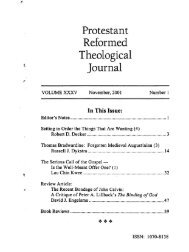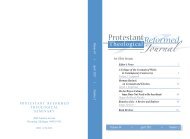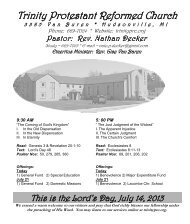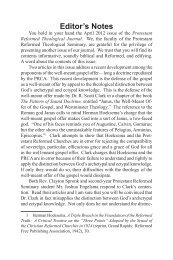November 2007 - Protestant Reformed Churches in America
November 2007 - Protestant Reformed Churches in America
November 2007 - Protestant Reformed Churches in America
Create successful ePaper yourself
Turn your PDF publications into a flip-book with our unique Google optimized e-Paper software.
<strong>Protestant</strong> <strong>Reformed</strong> Theological Journal<br />
sible issues. All this is not about preach<strong>in</strong>g the gospel to the people<br />
who gather there, but the emphasis is on mak<strong>in</strong>g them feel comfortable.<br />
The proclamation of the gospel is to be carried out <strong>in</strong>cidentally.<br />
A specifically postmodern form of this method is as follows:<br />
The emotions of the people are stimulated <strong>in</strong> order to make them<br />
forget the stress of everyday life and make them feel good. Events<br />
that usually <strong>in</strong>clude loud music are organized. While the apostle<br />
Paul demanded: “Brethren, be not children <strong>in</strong> understand<strong>in</strong>g” (I<br />
Cor. 14:20), here we see a (virtual) re<strong>in</strong>fantilization of man. Adult<br />
people <strong>in</strong> these so-called services behave like little children who<br />
give way to an apparently big urge for movement. Every attempt<br />
at be<strong>in</strong>g a responsible Christian is largely suffocated by emotional<br />
tenderness. I po<strong>in</strong>t out that this form of Christianity is absolutely<br />
connected to the matriarchal religiousness already mentioned.<br />
Here also God is pictured, so to speak, as the great mother-of-all<br />
who forgives everyth<strong>in</strong>g and above all understands everyth<strong>in</strong>g. If<br />
one actually wants to announce the gospel <strong>in</strong> this framework, it is<br />
stated as a rule accord<strong>in</strong>g to the formula: “God loves you and has<br />
a plan for your life!” Here the omnipotent, righteous, holy God,<br />
who demands repentance, is not proclaimed anymore.<br />
I rem<strong>in</strong>d you of the apostle Paul, who announced at the Areopagus:<br />
“but now (God) commandeth all men everywhere to<br />
repent” (Acts 17:30).<br />
Instead of proclaim<strong>in</strong>g this God, one beg<strong>in</strong>s to exert emotional<br />
pressure on the listener. One presses the emotionally struck one<br />
to repeat a prayer and then describes this as “conversion.” This<br />
so-called conversion is reflected <strong>in</strong> testimonies such as: Jesus<br />
has adopted (accepted) me, because I gave my life to Him. Man<br />
is <strong>in</strong> the center here. As a rule, there is no talk about God’s covenant<br />
of grace or about His election.<br />
But one may say: “Emotions are a part of be<strong>in</strong>g human.” It is<br />
not a bad th<strong>in</strong>g to appeal to man via the emotions.<br />
To this I respond: The manner of the proclamation gives the<br />
impression that truth is not an important matter. After such a sermon,<br />
the person does not expect anymore that there is truth. He<br />
does not want to hear sermons aimed at repentance. Instead, he<br />
desires a dialogue that is free of any claim that there is the truth,<br />
52<br />
Vol. 41, No. 1














